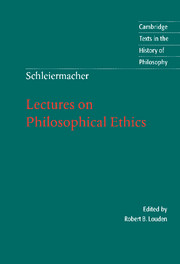Introduction
Published online by Cambridge University Press: 05 June 2012
Summary
Friedrich Daniel Ernst Schleiermacher (1768–1834) – father of modern liberal theology, founder of modern hermeneutics, translator of Plato into German, co-founder (with Wilhelm von Humboldt) of the University of Berlin, and early advocate of civil rights for both women and Jews – was clearly a man of many talents and interests. But over the years a number of German scholars have argued that it is in fact Schleiermacher's philosophical work in ethics that constitutes his most outstanding achievement. For instance, August Twesten, Schleiermacher's student and later successor at the University of Berlin, claimed in 1869 that Schleiermacher's ethics was “in truth the key to understanding all of his scientific works.” And Otto Braun, in the Foreword to his 1910 German edition of Schleiermacher's works, summarized his criterion of selection by stating that “ethics is the crux of Schleiermacher's philosophy; all of the writings belonging to ethics therefore form the foundation of the edition.” Hans-Joachim Birkner, founding editor of the more recent (and still incomplete) Kritische Gesamtausgabe (critical edition) of Schleiermacher and German editor of the ethics lectures translated below, begins his discussion of Schleiermacher's ethics by proclaiming that “without a doubt, Schleiermacher's philosophical ethics represents his most important achievement, and in the history of ethics constitutes a completely original project.” Finally, Gunter Scholtz, in a more recent study, argues that Schleiermacher's ethics, in comparison with all other areas of his work, “has a far greater significance: it tackles the more important problems, has a much wider perspective, and can lay claim to greater originality.”
- Type
- Chapter
- Information
- Schleiermacher: Lectures on Philosophical Ethics , pp. vii - xxxPublisher: Cambridge University PressPrint publication year: 2002
- 2
- Cited by

